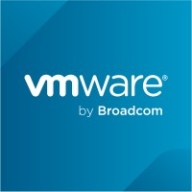

Nutanix Cloud Infrastructure and VMware Cloud Foundation both compete in the hybrid cloud infrastructure category. Nutanix seems to have the upper hand in ease of administration and pricing flexibility, while VMware excels in integrated virtualization features.
Features: Nutanix Cloud Infrastructure offers high-performance I/O and high availability, as well as ease of administration highlighted by one-click hypervisor and firmware upgrades. Its converged storage infrastructure stands out, providing significant flexibility and scalability. Users value its robust monitoring and alerting capabilities. VMware Cloud Foundation is praised for its comprehensive virtualization features, effectively managing a complete data center from a single platform. Its extensive capabilities are well-regarded in hybrid cloud environments.
Room for Improvement: Nutanix Cloud Infrastructure could improve by offering more integration with external storage solutions and broadening support for older systems. Pricing transparency and cloud integration are also areas where users see potential for enhancement. VMware Cloud Foundation users express concerns about its high pricing and complex licensing. There's a need for improved documentation and simplifying troubleshooting and deployment processes.
Ease of Deployment and Customer Service: Nutanix Cloud Infrastructure is noted for its straightforward deployment in both on-premises and hybrid settings. Features like one-click operations simplify tasks, and customer service is commendable for its prompt, knowledgeable support. VMware Cloud Foundation is recognized for its strong support infrastructure. However, its initial setup can be complex, which makes having reliable support essential. Its deployment flexibility across various environments is advantageous, although support might be more frequently required due to solution complexity.
Pricing and ROI: Nutanix Cloud Infrastructure is considered cost-effective, especially as it doesn't charge extra for hypervisor use. Users report savings in licensing and operational costs, observing ROI within a short time frame despite potentially high initial costs. Flexible licensing options are appreciated. VMware Cloud Foundation is often criticized for higher pricing, but users recognize the value in its comprehensive feature set. Bundled licensing options can mitigate costs, suggesting ROI is possible with strategic planning, despite the higher initial expenditure.
VMware Cloud Foundation allows cost and time savings by quickly deploying infrastructure requests and integrating automatic ticketing and backup services.
In terms of ROI, although VMware Cloud Foundation is expensive, it saves time in most cases, which indirectly saves costs for users.
When we send an email, an engineer is assigned within 15 to 20 minutes, and we get on a call to resolve the issue.
There are times when support is unclear, and even VMware support personnel may lack familiarity with certain parts, causing difficulties.
Based on my nine years of experience with VMware, I would evaluate their technical support as effective.
The technical support from VMware Cloud Foundation deserves a nine out of ten rating.
The scalability of Nutanix Cloud Infrastructure (NCI) deserves an eight out of ten rating, as there is no solution that is 100% efficient and there is always room for improvement.
When more hosts are added, performance goes slow.
VMware Cloud Foundation supports scalability and company growth.
VMware Cloud Foundation is quite scalable, receiving a rating of eight and a half to nine out of ten.
Compared to VM, we find it most stable.
Regarding stability, I would rate Nutanix Cloud Infrastructure (NCI) a seven out of ten.
The stability of VMware Cloud Foundation is very high.
If one component fails to operate in a timely manner, the entire infrastructure can go down because everything is interconnected.
I am currently satisfied with the stability of VMware Cloud Foundation, though having started only two to three months ago, I am still in the monitoring phase.
We hope Nutanix can integrate inside our current license module.
I would suggest that Nutanix Cloud Infrastructure (NCI) should develop their own P2V (physical to VM) tools instead of requiring users to rely on third-party solutions.
They should add AI features in the future.
VMware Broadcom needs to include auto resource allocation at the VM levels.
The maintenance cost has increased significantly, especially after Broadcom acquired VMware, with a shift from socket-based licensing to core-based licensing.
Each user needs deep knowledge of every aspect of virtualization.
The pricing is renewed every year, at almost $100,000 per year.
It costs more compared to VMware due to different licensing areas.
At first, it is cheaper than cloud services, so the cost is a major benefit.
The cost has become very high, especially after Broadcom's acquisition, altering the licensing model to a more expensive core-based system.
When comparing prices of both clouds, AWS is cheaper because they offer a free section for practice.
The price is quite higher than some other vendors.
When technology development or devops teams request server provisioning, the setup time has been reduced from hours to less than 20 minutes.
The replication method between Nutanix clusters is a valuable feature.
It is easy to use, and it's easy to maintain.
The solution now offers auto-deployment of VMs.
All features of VMware Cloud Foundation are valuable to us, as it covers every industry standard protocol and requirement protocol.
VMware Cloud Foundation allows for extensive customization, aligning with our customer requirements.
| Product | Market Share (%) |
|---|---|
| VMware Cloud Foundation | 18.1% |
| Nutanix Cloud Infrastructure (NCI) | 8.4% |
| Other | 73.5% |

| Company Size | Count |
|---|---|
| Small Business | 91 |
| Midsize Enterprise | 77 |
| Large Enterprise | 82 |
| Company Size | Count |
|---|---|
| Small Business | 8 |
| Midsize Enterprise | 3 |
| Large Enterprise | 27 |
Nutanix Cloud Infrastructure (NCI) is a top-ranking HCI software, cloud management tool, and Software Defined Storage (SDS) tool that is marketed as the foundation for users' hybrid clouds. It offers a powerful and secure hyperconverged infrastructure to deliver all data and applications at any scale and on any cloud. The solution offers a complete software stack that allows users to unify their hybrid cloud infrastructure.
NCI’s services include computer, storage and network, hypervisors and containers, and deployment in public or in private clouds. The product also comes with built-in resilience, disaster recovery capabilities, self-healing, and high-security capacities. It provides further deployment flexibility through several software and hardware options and platforms. NCI includes a full set of enterprise capabilities. It can also be deployed on a wide range of servers from popular manufacturers.
The capabilities of the product are categorized into three main groups:
Outside of these categories, NCI also offers other capabilities:
Nutanix Cloud Infrastructure (NCI) Features
Nutanix Cloud Infrastructure (NCI) offers its customers various features and tools in each of the previously mentioned categories. The available features for users currently include:
Nutanix Cloud Infrastructure (NCI) Benefits
The product offers various benefits to users who utilize its capacities. Some of these include:
Reviews from Real Users
According to Gerhard J., an IT manager at Q4 Fuel, Nutanix Cloud Infrastructure (NCI) provides serious reliability and stability across the entire system makes for ROI.
A solutions architect at a computer software company describes NCI as a stable, straightforward to set up, and scalable solution.
VMware Cloud Foundation makes it easy to deploy and run a hybrid cloud. VMware Cloud Foundation provides integrated cloud infrastructure (compute, storage, networking, and security) and cloud management services to run enterprise applications in both private and public environments.
We monitor all Hybrid Cloud Computing Platforms reviews to prevent fraudulent reviews and keep review quality high. We do not post reviews by company employees or direct competitors. We validate each review for authenticity via cross-reference with LinkedIn, and personal follow-up with the reviewer when necessary.